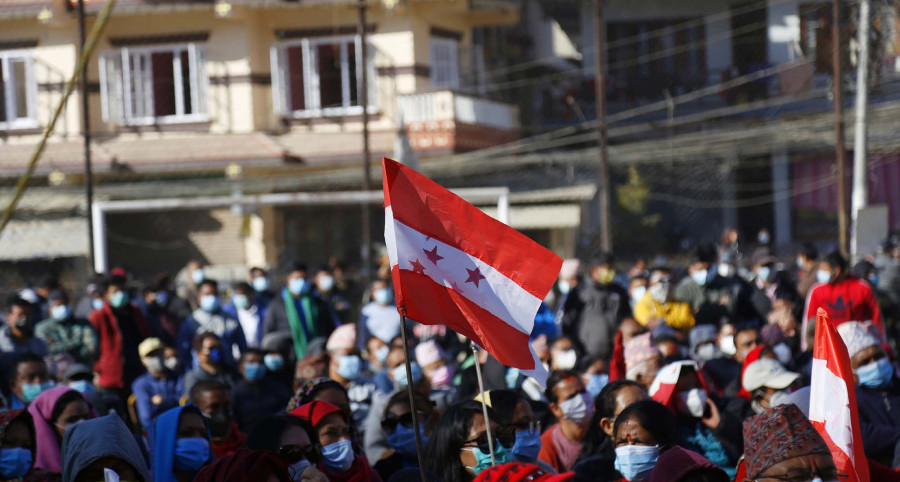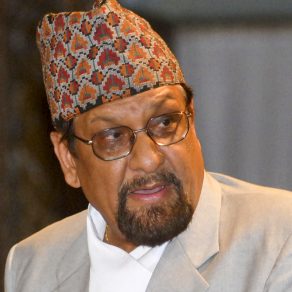Columns
Political turbulence amidst the coronavirus pandemic
Nepal is facing growing humanitarian losses and serious socio-economic consequences.
Ram Sharan Mahat
Nepal is currently facing political turbulence amidst Covid-19 pandemic, compounded with growing humanitarian losses and serious socioeconomic consequences. The dissolution of the House of Representatives and the declaration of mid-term elections in April-May 2021 by President Bidya Devi Bhandari at the recommendation of Prime Minister KP Oli has triggered a political storm in the nation. This arbitrary step was the consequence of a sharp power struggle within the ruling Nepal Communist Party which had a strong majority in Parliament. The prime minister argues that there was a conspiracy to remove him from his post by his rivals in the party despite the electoral mandate given to him as party president and parliamentary majority leader for five years, hence he felt the democratic need for a fresh mandate from a new election. Justifying the dissolution of the House and mid-term elections, President Bhandari announced that the action was in keeping with parliamentary practices and values.
There is widespread opposition from almost all political parties, civil society and constitutional experts to the declaration because the action contradicts constitutional provisions. This has led to strong street protests throughout the country, particularly by the ruling party and opposition parties. Only the Oli faction of the ruling party has launched street demonstrations supporting the dissolution.
Constitutional provisions
According to Article 85 of the constitution, the term of the House of Representatives is five years unless it is dissolved earlier in accordance with Article 76, that is in the absence of any political party with a majority in the House after a general election, and when any proposed prime minister supported by two or more parties fails to receive majority support in a vote of confidence. The constitution has other provisions that seek to ensure political stability. For example, a no-confidence motion cannot be registered until two years after the appointment of a prime minister; and if the no-confidence motion fails, another motion cannot be tabled for a year.
Both factions of the ruling party have registered their cases with the Election Commission to claim legitimacy as the official Nepal Communist Party. The faction led by Pushpa Kamal Dahal and Madhav Nepal replaced Oli as party chairman and even revoked his membership. The Oli faction, for its part, removed Dahal as executive chairman and expanded the central committee to more than 1,100 members. The Election Commission has refused to recognise either faction as the legitimate party for failing to abide by the Political Parties Act and their own party statute.
The power struggle within the ruling party is reflected in various dimensions. After seven ministers from the rival faction resigned from the Cabinet protesting the dissolution, the prime minister appointed new ministers to the vacant positions. The split at the national level has also permeated to the provincial levels with rival factions taking action against each other in the Provincial Assembly.
The current political events marked by unconstitutional actions and sharp divisions within the ruling party have created a favourable climate for the opposition parties, in particular the main opposition, Nepali Congress (NC). The general sentiment among party workers and supporters seems to favour the proposed mid-term election which could be to NC's advantage. However, as the country's oldest party committed to the democratic constitution and the rule of law, NC is opposed to the presidential decision. Despite the opportunity to take advantage of the situation, it has been launching street protests all over the country against the dissolution of Parliament.
The country is now awaiting the Supreme Court's verdict in response to the 13 writs challenging the dissolution of the House. The prime minister's explanation in response to the show-cause notice issued by the Constitutional Bench has become publicly controversial. He argues that the dissolution is a political move whose validity is not to be reviewed at the judicial level. He also mentioned that he was forced to dissolve the House and hold snap polls for a fresh mandate because of infighting within his party.
The Office of the President claims that the House has been dissolved in accordance with the constitution, past precedent and international practices. These explanations contradict the constitutional provision that states the specific grounds for a possible House dissolution as mentioned above. A prime minister with majority support in Parliament has no authority to dissolve it. House dissolutions in the past by the then prime ministers under the 1990 constitution had too been subjected to judicial reviews at that time.
Under the current circumstances, the Supreme Court verdict is being eagerly awaited. It remains to be seen whether it restores the House by invalidating the dissolution because of its unconstitutionality or permits mid-term elections for a fresh public mandate validating the dissolution. There is a public impression of the prime ministerial attempt to influence the independent judiciary because of his strong statements ruling out the prospect of a House restoration. He even alleges the critics of his unconstitutional action as being anti-national and anti-democratic.
Impartial decision
On the other hand, almost all political forces except that of Prime Minister Oli, constitutional experts, civil society and public media are pleading for an impartial judicial decision to invalidate the dissolution and restore the House. There have been street protests by civil society demanding invalidation of the act where the protestors were assaulted by the police. Four former chief justices of the Supreme Court also issued a statement terming the dissolution being against the fundamental law of the land. There are also other writs under review by the Supreme Court questioning the government ordinance to alter the appointment provisions of constitutional commissions, and the Cabinet reshuffle by Prime Minister Oli after assuming caretaker status following the dissolution.
Amid the suffering brought about by the coronavirus pandemic that requires the government to deal with the crisis and revive the economy as a priority, there is widespread national engagement in political conflicts. In addition to the nationwide debates, opposition and agitation against the unconstitutional act, there is public agitation from a section demanding the return of constitutional monarchy and the Hindu state. The latter has resulted from the failure to meet public expectations by the new political structure under the new constitution due to poor governance and mismanagement. All this demands a better quality of governance to fulfil socio-economic requirements meeting public expectations, effective implementation of the constitution and fair judgement by the independent judiciary, like the recent one by the United States judiciary denying unwarranted pressure by the then president Trump to favour his unlawful complaint to overturn the election results.




 24.71°C Kathmandu
24.71°C Kathmandu















